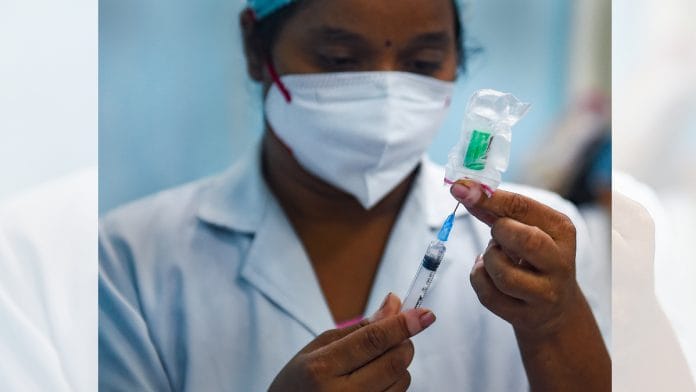New Delhi: With experts calling for booster shots (third dose) for healthcare workers and those with low immunity, India is considering the option of using a different vaccine platform from the one given for the first two doses.
One of the Covid vaccine working groups of the National Technical Advisory Group on Immunisation (NTAGI), the highest body to evaluate scientific data related to vaccines, has had discussion on the option of using different boosters, according to official sources.
This option is among the considerations in the booster dose discussions, a senior government official said on condition of anonymity.
Many studies have shown that the immune response is better when vaccines are mixed.
Last Friday, NITI Aayog Member (Health) V.K. Paul said data seems to suggest that mixing vaccines gives better outcomes, while answering a question from ThePrint about a World Health Organization (WHO) advisory panel’s recommendation for a booster dose for people who have received an inactivated vaccine.
“Discussions are on in WHO (on booster shots) and as fresh data comes in on vaccine impact… on the basis of that some observations like that were made. So far as I know they are talking about mixing vaccines A and B. Various scientific fora are watching this and we are looking at this data,” said Paul, who is co-chair of the National Expert Group on Vaccine Administration for Covid.
“Laboratory immunity is better, they found. It is possible that homologous vaccination combinations may have one place, heterologous (mix and match) may have an improved outcome. We will keep a watch on this. We are mindful of the science on this,” he added.
Also read: Nearly 58% unvaccinated Indians still vaccine hesitant, claims Local Circles survey
Booster shot decision long awaited
The NTAGI has been deliberating on booster shots for some time now, but a decision is still elusive. India began vaccinations on 16 January when both Covaxin and Covishield began being administered at a gap of 28 days. This means healthcare workers who got vaccinated first will soon be complete 10 months of vaccination.
The Indian Council of Medical Research (ICMR) told a parliamentary panel last week that booster shots are required after nine months.
Currently, there are six vaccines in the country that have been granted the emergency use authorisation — Covishield, Covaxin, Sputnik V, Moderna, Johnson and Johnson and ZyCov-D.
Covishield and Sputnik V, have a similar viral-vector based vaccine platform. While Sputnik uses two different viruses for the two doses, Covishield uses the same one. Covaxin is a whole virus inactivated vaccine, the kind that the WHO panel seems to favour for early boosters. ZyCov-D, which is yet to be rolled out, is a DNA vaccine.
The other two vaccines are still unavailable in India over issues around the indemnity clause.
Officials say given the supply situation of both Sputnik V and ZyCov-D, the only mixing that is logistically possible at this stage is to follow up Covaxin with Covishield or vice versa.
There is a lot of global data available on the mixing of the AstraZeneca vaccine developed by Oxford University (branded Covishield in India) and mRNA vaccine (Pfizer-BioNTech or Moderna). India’s own mRNA vaccine by Gennova Bioparmaceuticals is still in the trial stage.
Vaccine mixing data is encouraging
Globally, a lot of data on vaccine mixing was generated when many European countries stopped administering the AstraZeneca vaccine because of fear of serious side effects. In many such countries, people who had received the first dose of the Oxford vaccine, got a second dose of an mRNA vaccine.
In June this year, medical journal The Lancet published the findings of a study from Spain where AstraZeneca and Pfizer vaccines were used.
“BNT162b2 (Pfizer-BioNTech) given as a second dose in individuals prime vaccinated with ChAdOx1-S (AstraZeneca) induced a robust immune response, with an acceptable and manageable reactogenicity profile,” the study concluded.
In October, the US Food and Drug Administration also allowed mix and match of vaccines as boosters for specified groups of adults. “The use of each of the available Covid-19 vaccines (Moderna, Janssen) as a heterologous (mix and match) booster dose in eligible individuals following completion of primary vaccination with a different available COVID-19 vaccine,” it said.
(Edited by Amit Upadhyaya)
Also read: ‘Religious exemptions’ for Covid-19 vaccines are on the rise. Leaders need a new message






